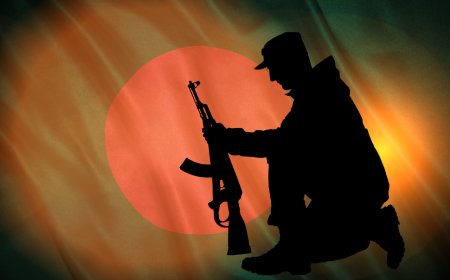Childhood’s End
Soon we will no longer be able to rely on Prof Yunus's global reputation to smooth things over with allies and adversaries alike. It is time for Bangladesh to invest in its diplomatic capacity. The future belongs to those who can skillfully maneuver on the world stage.

It is hard to deny that during Sheikh Hasina’s long reign, Bangladesh’s international diplomacy became progressively more dilettante.
During the last years of the regime, the foreign services community acted little more than protocol offices for VIPs and a foreign-honour hunting service for the potentate.
Public diplomacy also became so riven with corruption and inefficiency that the regime outsourced its messaging to the world to private contractors, who concocted fake stories under fake author names and planted them in dubious outlets.
The Awami regime’s diplomatic arm was much stronger in the early years. Advisers like Gowher Rizvi covered up the uneven performances of various foreign ministers with his international experience and skills.
However, after the sham election of 2018, a lot of the most critical diplomatic interactions fell under the sway of India, the Awami regime’s closest backer and patron in the international arena. And like a little-used muscle, Bangladesh’s diplomatic skills atrophied.
Events of 2023 revealed the regime’s dependency in stark relief. India acted as the main obstacle to US efforts to pressure the Awami regime into holding more fair elections and reintroducing democracy in Bangladesh. Also, India shepherded to victory the patently absurd nomination of Hasina’s unqualified daughter as the regional head of the World Health Organization.
That was the crux of Bangladesh’s total diplomatic efforts in those years: to serve only the interests and personal wishes of Sheikh Hasina. National interest was not even in the backseat.
It's not that BNP, the other main political party, boasts an excellent record in international diplomacy over the last two and a half decades, either. BNP’s last stint in power, from 2002 to 2007, demonstrated the rare feat of simultaneously and seriously alienating all three of the critical global powers for Bangladesh: the USA, India, and China. A nadir of diplomacy that made BNP suffer in the wilderness for the next two decades. And during those years in the wilderness, BNP’s diplomatic efforts for international recognition of political repression in Bangladesh amounted to pitiful lobbying efforts and falling for various ludicrous charlatans.
In the immediate aftermath of the fall of Hasina, Bangladesh faced the most severe diplomatic challenge in the last few decades. The challenge overwhelmingly came from only one quarter, India.
Everyone expected that India would respond negatively if Hasina were to be removed from power, whether by a mass uprising or a coup. Even then, the intensity of the broad and deep fury caught most Bangladeshis with surprise. The irrational hostility seemed to support the dark speculations about the India-Awami nexus.
However, there is another reason apart from the close India-Hasina relations. The current right-wing government in India, its cheerleading media, and its huge supporter base throughout the world are an extremely chauvinistic bunch. For domestic political reasons, these groups and people always strive to project a hyper-nationalistic image that cannot tolerate the slightest setback or reversal. These people took Hasina's ouster in their backyard as a personal affront, made publicly.
While the Indian government, pundits, media, and tens of millions of social media warriors mobilized against post-Hasina Bangladesh, there was not much help coming from other quarters.
European governments remained skeptical about the abrupt change that had taken place. China was inscrutable behind the impassivity. The Biden administration was supportive, but it was preoccupied with the coming election in November that was destined to put it in pasture.
It was a very precarious situation for Bangladesh, diplomatically. The narrative of the mass uprising and the fall of the dictator could have gone totally sideways. And Bangladesh’s diplomatic community was wholly unprepared for the onslaught. There was great enthusiasm in the media and among Bangladeshis all around the world to meet the challenge against the post-uprising Bangladesh, but it was hardly enough.
Cometh the hour, cometh the man.
Professor Muhammad Yunus stepped in to take charge of Bangladesh after the fall of the Hasina government. It is no exaggeration to say that Muhammad Yunus is the most famous Bangladeshi in the country's history since its independence. Even Sheikh Mujibur Rahman did not have such widespread global name recognition in his heyday after 1971.
Professor Yunus has almost direct access to the few hundred people who control the levers of international political and economic power. His image is such that even Donald Trump, who spares almost nobody who ever directly criticizes him, has been remarkably restrained about Yunus, who has been a close acquaintance of Bill and Hillary Clinton for decades.
Professor Yunus alone was more than enough to successfully parry the vehement Indian diplomatic hostility, open the doors of the halls of power receptively in Europe, the Middle East, East Asia, and North America, and facilitate a swift and smooth transition to a globally recognized normal government in Bangladesh.
I compare this godsent development for the disarrayed and unskilled national diplomatic community to getting a cheat code in a computer game. You know, cheat codes that enable a level three player suddenly get the powers of a level ten player. Professor Yunus was our cheat code in those months. Many articles have already elaborated on how it could have gone very wrong had Yunus not taken the helm.
However, Professor Yunus will not be in charge of Bangladesh’s foreign and domestic affairs for much longer. By December 2025 or June 2026, he will hand over the reins to an elected political government. His bitter experience in domestic politics suggests that he won’t stick around as an active elder statesman. And his successors will lead Bangladesh in a much more perilous world than it was just a few years ago.
There are signs everywhere that the postwar liberal world order, underpinned by American hegemonic power, is coming to an end. In a multipolar world, regional powers will have increasing sway in dictating terms to small and weak neighbors.
If smaller nations want to live with dignity and sovereignty, they must possess internal solidarity, deterrent military power, and diplomatic skills to forge balancing alliances with various powers.
Diplomacy will be far more important in the future than it has been in the past if we want to chart an independent course toward peace and development. We need to step up and be an expert player in the international arena.
How do we do that? As a layman, I can only offer personal opinion, not expert advice. A few ideas without elaboration are. We need to have more engagement of our serving foreign service officers with domestic and foreign pundits and media.
We know that the best of our officer intakes go into the foreign service. Frequent interactions with people and pundits will keep them sharp and also let people identify who among them is most promising.
We should encourage meritorious Bangladeshis, both at home and abroad, to pursue careers in international organizations, government services, and political organizations of their respective countries of residence. A broad and thick presence of Bangladeshi everywhere in the corridors of power can only help our national interest.
Our diplomatic and foreign policy community needs to cultivate personal, friendly relationships with politicians, pundits, and media personalities worldwide. Personal relations matter greatly in diplomacy. Foreign friends should be invited to Bangladesh for visits frequently.
We should try to develop a world-wise and thriving foreign policy community comprising of serving and retired government officers, pundits, think tanks, media commentators, etc.
In all the above points, we can see that both India and Pakistan are far ahead of us and are worthy of emulating.
Our foreign policy community should avoid discussion of international geopolitics and great power strategy as much as possible and focus more on politics, economy, and technological development of the leading countries of interest.
There is a saying that stupid people do geopolitics, real people do politics.
We spend too much time discussing things like the "chicken neck," "corridor," seven sisters," "Asia-Pacific strategy," etc and too little time analyzing and disseminating on what is happening in politics and thinking in Delhi, Beijing, Washington DC, Brussels, London, Canberra, and such.
If we want to understand what is going on and how we can influence the course of events to safeguard our interests, we need to develop a significant number of country experts.
However, for now, we must focus on a proper thank you and send-off for Professor Yunus for his guardianship of our nation during a critical period.
Politics degrades all, even Nobel Peace laureates and global icons.
But we should remember him at his best, in which he is inimitable. We should ensure a dignified departure for him within a year, a dignity much deserved by a global giant among Bangladeshis.
What's Your Reaction?














































































